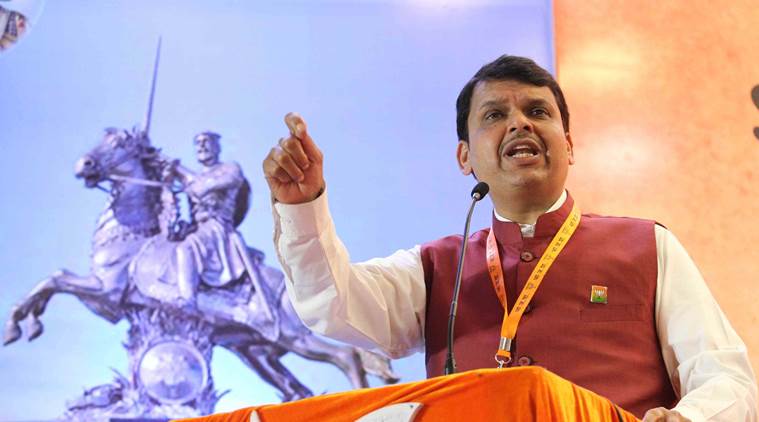- India
- International
Fadnavis to Sitharaman: Use grading system in next year’s assessment
Grading fosters healthy competition and cooperative federalism , writes Maharashtra CM
 Chief Minister of Maharastra Devendra Fadnavis (Express Photo by Deepak Joshi)
Chief Minister of Maharastra Devendra Fadnavis (Express Photo by Deepak Joshi)
The Maharasthra chief minister Devendra Fadnavis has asked the commerce and industry minister Nirmala Sitharaman to use a grading system instead of rankings in the upcoming assessment of states for “ease of doing business”.
“I would also like to reinforce that in the next assessment for measuring ‘ease of doing business’ across all the states and Union territories, a method of grading may be considered,” Fadnavis requested Sitharaman in a letter dated October 24, 2016. Sitharaman had released the 2016 state rankings for “ease of doing business” on October 31, 2016, in which Maharasthra was ranked number 10.
Watch what else is in the news
“Grading fosters healthy competition and cooperative federalism giving impetus to states to work together towards development,” noted Fadnavis. The letter was written by Maharashtra CM at a time when various states were frantically submitting various evidences to improve their assessment score for 2016 rankings.
“Furthermore, at least one round of face-to-face interaction with the DIPP (Department of Industrial Policy Promotion) assessment team where specific action points can be discussed should be incorporated. This was done during the assessment in 2015. If required, state team can come to Delhi to interact with the assessment team. This helps give a clearer picture and resolve any issues then and there,” Fadnavis noted. The DIPP works under commerce ministry.
On October 31, 2016, Sitharaman declared that Andhra Pradesh and Telangana (98.78 per cent) had both topped the ranking for best states to do business — the assessment process was done jointly by the World Bank and the DIPP. Gujarat (98.21 per cent) emerged as the third best state to do business in the country, followed by Chhattisgarh (97.32 per cent), Madhya Pradesh (97.01 per cent) and Haryana (96.95 per cent). This “ease of doing business” index was based on implementation of DIPP’s 340-point Business Reform Action Plan.

On October 24, 2016, when Fadnavis wrote this letter, Maharsthra had the assessment score of 89.88 per cent. “Maharasthra’s current score is 89.88 per cent but it is expected to be above 95 per cent. As discussed in the meeting held on September 8, 2016, at DIPP, Delhi, seven more evidences have been submitted as a physical copy. The state has also responded with appropriate letters from state department affirming that the reforms have been implemented for the entire state and with requisite clarifications in response to the video conference held on October 18, 2016, with DIPP secretary,” Fadnavis stated in the letter.
Fadnavis, then went on to highlight some of the “pertinent best practices” implemented in Maharashtra. On October 31, Sitharaman declared that Maharashtra was ranked number 10 as it had an assessment score (or implementation score) of 92.86 per cent.
The letter from Fadnavis was preceded by a letter from S S Kshatriya, chief secretary, Maharashtra — which was written to Ramesh Abhishek, Secretary, DIPP — where he had expressed his concerns “regarding the assessment of reforms that relate to providing evidences of compliance for all ULBs (urban local bodies) and IDCs (industrial development corporations).” The letter was written by Kshatriya on September 7, 2016.
Kshatriya stated: “Maharashtra has over 200 urban local bodies (ULBs), and it is difficult to implement the reforms in all of these at this stage, as implementation across all ULBs will require gradual and incremental growth. Therefore, you are requested to consider the evidences for the Maharashtra Industrial Development Corporation (MIDC) and the major ULBs in the state.”
He further added: “Similarly, for the recommendation on filling up at least 90 per cent of vacancies in District Courts/Commercial Courts, we believe that fixing a range such as 80 per cent to 90 per cent may be more appropriate than an absolute percentage value since the hiring of judges is an ongoing process. The state has already filled up 86 per cent of the vacancies, and the appointment of 227 judges is underway, post which the working strength would be 90 per cent.”
According to Kshatriya, Maharashtra’s “commitment” to ease of doing business was “substantiated” by the Asian Competitiveness Institute’s 2016 report where the state was ranked first in “ease of doing business and business competitiveness” amongst all states. “The assessment balances the hard data from each state with
the result of surveys undertaken amongst investors, government officials and academic experts in the area and hence, is a well-founded indicator of ease of doing business in the state,” he noted.
Apr 26: Latest News
- 01
- 02
- 03
- 04
- 05







































